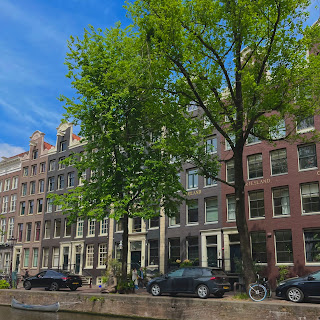Hallo from Amsterdam!
I have just completed my first official week here in the Netherlands, and it truly has been a beautiful experience! I am learning so many new things both academically and personally. For example, I am much better at navigating public transportation than I originally thought. Yay me!

Additionally, we learned about the history of the Netherlands this week. The country has not always been the accepting, free-loving, sexually open country we know and love today. In actuality, this version of the country only came into existence following protests from the 1960s and 1970s (Mijnhardt, 2010). Prior to this, the Dutch held very different views on sexual activity. Actions such as adultery or concubinage (the cohabitation of two people premaritally) were heavily criminalized, with some instances leading to execution (Rose & Heijmans, 2021). Furthermore, interpersonal relationships were strictly regulated. While there were no explicit laws against interracial marriages, there were harsh punishments for interracial sex (Rose & Heijmans, 2021). For example, sex between an unmarried European woman and a man of a different ethnicity could warrant the same punishment as adultery, despite no infidelity having taken place (Rose & Heijmans, 2021).
Severe punishment did not apply to men who committed the same acts, however. Instances in which a European man had sex with a non-European woman were not punished to the same degree. We discussed this kind of double standard in my Sociology of Gender class. We focused more on the social aspects of infidelity, analyzing the ways in which people respond to infidelity in women compared to men. Women almost always faced more social ostracization. This double standard was exacerbated by race. Because enslaved people were seen as property rather than human beings, enslaved women were often subject to forms of sexual abuse with no legal protections (Beckles, 2004). Her body was not her own, and she was therefore entitled to no rights or autonomy regarding herself. In some instances, men who enslaved women would provide their male guests with an enslaved woman overnight to have sex with (I would like to note here that I understand these instances are actually rape, but I say sex instead as it would not have been considered rape at the time). The strength of these women is inspiring, but their situation is equally devastating. I can only be grateful for the progress our society has made. Despite these horrors, there were still Black people who managed to work their way into positions of power. For example, Elisabeth Samson was a freeborn Black woman who inherited a coffee plantation from her partner, a wealthy German officer (Rose & Heijmans, 2021).
Overall, I have already learned so much from this trip, and I can't wait to learn and see more. Here's another thing I learned: some houses here are painted all black; this is because the black paint served as a warning to others that the house was infected, typically during the Black Plague. Because the houses are UNESCO World Heritage Sites, the outside facade cannot be changed, and the houses remain black to this day.
Tot Ziens,
Claire💌

Beckles, H. M. (2004). Perfect property: Enslaved Black women in the Caribbean. in E. Barrietau (Ed.), Confronting Power, Theorizing Gender: Interdisciplinary Perspectives in the Caribbean (Chapter 7). University of the West Indies Press.
Mijnhardt, W. (2010). A tradition of tolerance. In E. Beamusca & J. Verheul (Eds.), Discovering the Dutch, on culture and society of the Netherlands (Chapter 8). Amsterdam University Press.
Rose, S., & Heijmans, E. (2021). From impropriety to betrayal: Policing non-marital sex in the Early Modern Dutch Empire. Journal of Social History, 55(2), 315-344.
"I have acted with honor and integrity in producing this work and am unaware of anyone who has not"
/s/ Claire Adams



No comments:
Post a Comment